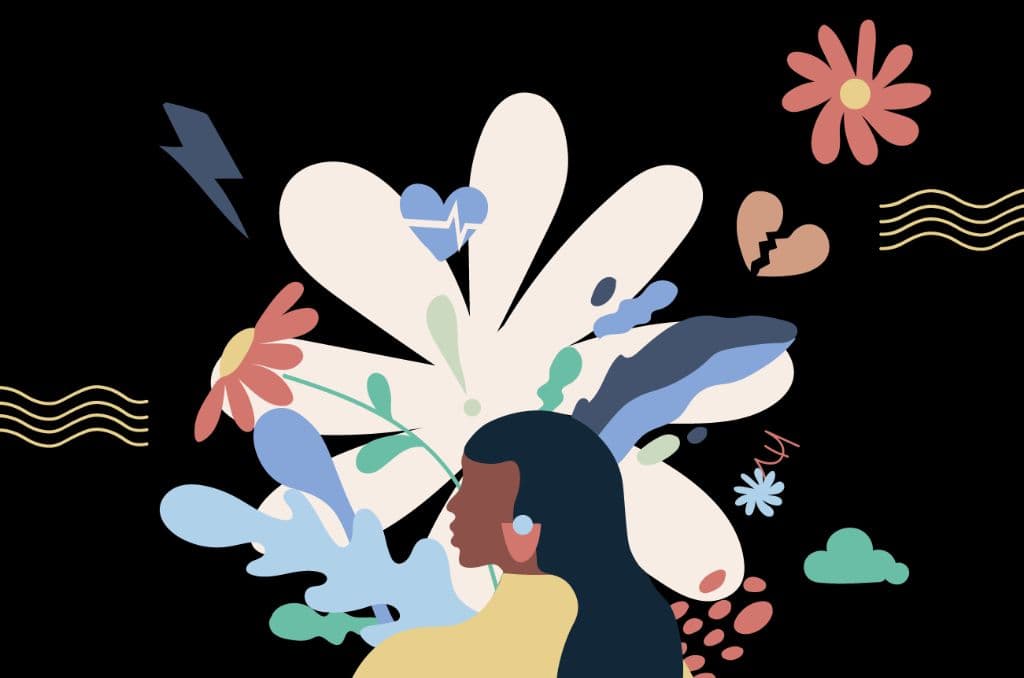This blog is clinically verified with medical inputs by Dr. Neha Gupta, MD.
It was the last semester of our college life when my friends and I could not stop talking about the experiences that we still had to tick off our bucket lists before college ended, and life set us on our individual paths. Covid 19, however, came in like a ghost and ended up like glitter; everywhere.
Our college shut down, so did the world, and our bucket list was forgotten. Apart from our last semester, the pandemic took away from us, the hopes of living our college life one last time.
Fast forward to 6 months later, college finally opened up for us to go write our finals. I was so excited to see all my friends and classmates again.Amongst all the conversations I had, most of them seemed like old times. Just the way they used to be. But a few were rather strange.
These "strange" conversations were with the people I once knew too well. They were my buddies and something was not right. The same people that I once knew for their confidence seemed to be hiding behind some imaginary curtain that existed only for them. Along with this I could see, their ability to converse with a stranger or an acquaintance had taken a massive hit. Even with familiar people around, they weren't talking much. These were the same people that would find it hard to put a break on their tongues. Not only this, I knew them for being natural extroverts. They were great performers and orators, and it was quite shocking to see them like this!
That's when I started digging into the matter a bit more.
A little bit of introspection reminded me of the times when I was more than I'd admit, socially anxious.There were times I'd stay quiet because I thought the world outside wouldn't value what I had to say. I would find it hard to maintain eye contact whilst talking to someone. After working on myself for some time, I'd realized that a lot of it was due to my self doubt. It was as if these friends of mine were projecting a recap of the times I'd been through.
All this time in quarantine and isolation had probably led them into a process of deep thinking and self doubt.
For as much as I'd remember, they were anxious before the lockdown too, but not to this extent. I would see them putting a cap on it. But now there was no cap, no cover. The pandemic had heightened their anxiety and hence it was so noticeable, even though they were trying to hide it.
This wasn't the case with only them. The more people I talked to, the more obvious social anxiety seemed. And the more I talked about social anxiety around people, they'd all tell me about similar experiences.
“As a psychiatrist, I have seen an increase in the number of people approaching me for their newly developed anxiety symptoms. After an initial online assessment, I called them for a physical consultation. It was surprising to see how many of them weren’t comfortable with doing so.” says Dr.Neha.
I’m sure there are many more who are going through something similar or might know someone who is, which only emphasizes the importance of discussing social anxiety , especially while resuming into our post Covid life.
What is Social Anxiety?
The irrational anxiety, fear, embarrassment, and self-consciousness a person feels, when one has to face social situations can be described as Social Anxiety. The social situation could be anything, for example: feeling anxious while giving a presentation at work or while initiating a conversation with someone you just met, varying from person to person.
As general as the examples seem, social anxiety is very common, and we all experience it to some extent in one situation or the other.
But the way each of us deal with it might be different. Some might be able to dive into the situation directly and fight their fears instantly, which gives them the confidence to move further.
While some of us might just isolate ourselves in attempts of avoiding any potential situation that could put us in an anxiety inducing space.
While one of the main reasons of social anxiety with the prevalence of Covid 19 is due to the long periods of isolation during lockdown, one more factor is the fear of resuming our lives to our normal routines which we had before. More like the fear of coming out of our comfort zones. Remember the feeling of going back to school after summer vacation? Something like that.
A few triggers that one can experience while resuming their life to the outside world are:
- Walking in the streets, crowded with people
- Being in close proximity with anyone
- Day to day interactions with people at workplaces, colleges, and other public places
- Getting annoyed at people or certain things they do which would have been perceived as normal otherwise
- Public speaking
- Random eye contact with anyone or eye contact while having conversations
- Being overly cautious while taking measures to prevent contracting the virus
What social anxiety feels like?
Though different people experience different symptoms, if you feel any of the following abnormalities during social situations you might be experiencing social anxiety:
- Tense Muscles: Our muscles tend to get tight and tensed up as a response to potential danger. Even when the situation might not be so dangerous. This is a way our bodies seem to prepare us to tackle a situation.
- Brain fog: Staying indoor, with minimal physical interaction with people during the lockdown has made us accustomed to or rather used to it. When going out and seeing so many people, our brains need time to re adjust to the environment. Before we fully adapt to the social environment again, we might feel as if our brains have gone dull and feel a decline in the ability to think clearly.
- Shortness of breath: Many people when anxious, face a problem with breathing. They seem to feel as if they’re out of breath or can’t breathe properly. Next time you notice you’re breathing irregularly when you’re anxious, try counting down to 10, while focusing on breathing slowly. Try to feel every breath you take.
- Not being able to stay still among people: People with social anxiety tend to get fidgety and have a hard time staying put in one place around people. If you have social anxiety, you might find yourself walking away from people in between conversations or you might be moving way more than usual.
Social Anxiety due to fear of contracting Covid 19:
There’s so much information around us to help us take precautions from contracting the virus.
And it is completely necessary for us to do so, but at times we might be stressing ourselves too much. Even when the measures are taken, we might tend to overdo them, which can contribute to our anxiety.
Some examples can be:
- Using a sanitizer every few minutes.
- Getting paranoid as soon as we hear someone sneeze or cough around us.
Effect of Covid-19 restrictions on already diagnosed social anxiety:
For people diagnosed with social anxiety, most of the treatment and therapy focuses on facing their fears head on. With the covid-19 outbreak and all the restrictions that came with it, their progress in dealing with social anxiety could have been put on halt. It is already a common trait of socially anxious people to isolate themselves in order to avoid embarrassment, which in turn only aggravates their anxiety. This is facilitated further with all the lockdowns and quarantine regulations, where people might just use it as an excuse for their isolation, which might slow down or completely reset their journey to becoming a less anxious person.
Coping Strategies to Reduce Social Anxiety
1. Facing Your Fears : After staying at home for a long time it might seem daunting to go out and have a social life for a few.
- As with anything in life, there is no better way to beat this fear than facing it which will make you a more confident person.
- Making a list of all the fears and things that are keeping you down, could be the first step.
- Go out there and indulge in all those activities that you wrote down and mark them off your list. This will help you realise that all those things aren’t as scary as you thought they’d be, and will help you grow as a person. For example, if you’re skeptical about your communication skills, call up a friend you haven’t talked to in a long time and talk to them or you could talk to someone new online and try discussing stuff that you’d like to talk about.
2. Visualisation : If there’s a situation or event that requires you to be there and this induces fear and anxiety in you,start visualising it in advance.
3. This situation, for example, could be when you have to meet somebody. Visualising this meeting in advance gives you the chance of preparing what you could say and could do if your anxiety kicks in, which would ultimately help you at the time of the actual meet.
4. Practice Relaxation : There are various relaxation techniques that help us reduce our stress and anxiety, such as meditation. Search these techniques online and select some which you think would be best for you.
5. Cognitive Behaviour Therapy (CBT) : CBT is carried out with the help of Psychiatrists and counsellors. They help people eliminate their negative and unhelpful ways of thinking to change the way they feel and behave, with the goal of improving the person’s way of life.
6. Pharmacotherapy : This is usually adopted in more severe cases. Unlike therapy, a person diagnosed with social anxiety is treated with medicines prescribed by a doctor, to lower their anxiety.
7. Keeping a daily gratitude journal : A lot of anxiety is caused by negative thinking. Maintaining a gratitude journal makes us realise about all the things that are going well for us. This helps in shifting our mindset to a positive one. According to various studies a gratitude journal increases happiness in people and helps in coping with depression too.
8. Connecting with people : Connect with your friends and family. Try to talk to them about stuff that you keep only to yourself. Do this with people from your inner circle where you feel comfortable and vulnerable. Once you develop confidence, start expanding your circle of friends gradually.
While social anxiety might make you feel like there is no end to it, believe me, there is.
You can change it and come out as a confident person! If things still seem really tough, do not hesitate to reach out to a mental health professional for support.
Disclaimer : This information is provided for educational purposes and should not be construed as medical advice. Please consult with your healthcare practitioners before undertaking any changes in your diet or adding supplements.
ProactiveForHer is a digital clinic for women, offering accessible, personalized, and confidential health-care solutions. We offer products and services for out-patient health concerns of Indian women, across their lifetime - from puberty to pregnancy to menopause. To know more on the sexual and reproductive health of women, visit https://www.proactiveforher.com/

